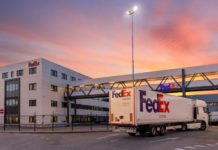Forwarders are providing stability for shippers amid tariffs, de minimis reform and new compliance demands, Executive Director of the Airforwarders Association (AfA), Brandon Fried (pictured, second from left), told members of the Los Angeles Air Cargo Association on 12 September.
AfA members are helping customers adapt to shifting trade flows and rising costs by keeping freight moving and offering practical solutions in uncertain markets, he said.
Fried pointed to pressures that continue to test supply chains, including cyber risks, an increase in extreme weather events, and geopolitical instability in Ukraine, the Red Sea and the Taiwan Strait.
He added that aging airport warehouses, truck congestion, and outdated facilities still hold the industry back, underscoring the importance of federal investment in cargo infrastructure.
“Forwarders are the stabilizing force when disruption hits,” said Fried. “We were tested by shocks in 2024, and we adapted. We are ready to protect shippers and keep goods moving through whatever comes next.”
AfA members are also finding opportunities, he continued. Reshoring and nearshoring are shifting flows from China toward Southeast Asia and Mexico, while defense logistics and pharmaceuticals continue to deliver steady volumes, while semiconductors are establishing high-value growth corridors.
Fried said forwarders are applying technology beyond the hype, with Artificial Intelligence (AI) already being used in pricing, Customs automation, and fraud detection, while automation and paperless processes are driving efficiency. Sustainability remains a critical test, with demand for greener supply chains rising faster than the supply of Sustainable Aviation Fuel (SAF).
President of the Los Angeles Air Cargo Association, David Gibson, added: “As tariffs shift and regulations tighten, AfA members are proving that they are not just adapting, they are leading. Their ability to find solutions in the face of uncertainty is what keeps cargo moving through LAX and beyond.”









